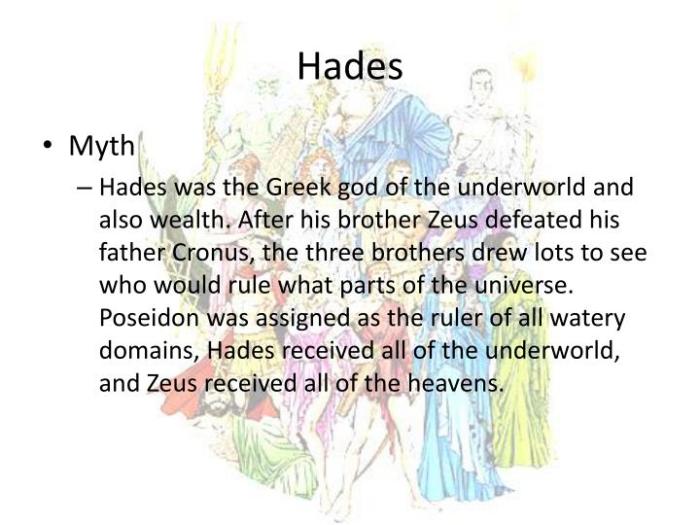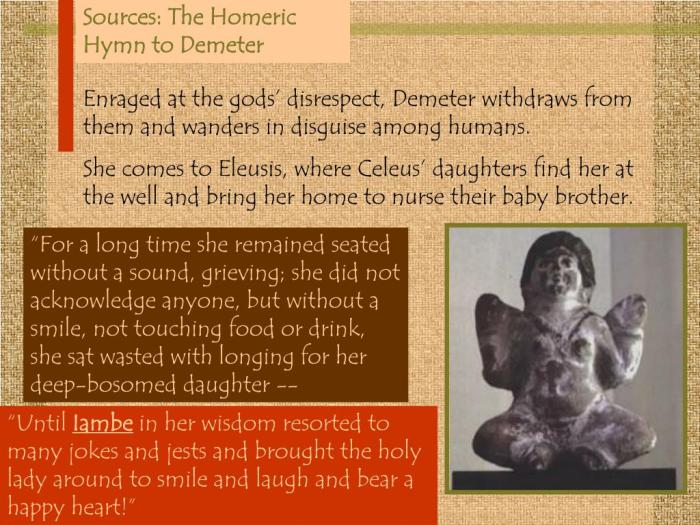Demeter’s prayer to hades analysis – Demeter’s prayer to Hades, an analysis of grief, desperation, and divine compromise, sets the stage for this enthralling narrative, offering readers a glimpse into a story that is rich in detail and brimming with originality from the outset. The tale of Demeter’s search for her abducted daughter, Persephone, and her subsequent plea to Hades for her return, has captivated audiences for centuries, inspiring countless works of art, literature, and music.
This analysis delves into the depths of Demeter’s prayer, examining its key themes, motifs, and the profound impact it has on the natural world, the relationship between Demeter and Hades, and the mythology of ancient Greece as a whole.
Demeter’s Relationship with Hades

Demeter, the goddess of agriculture and fertility, shared a complex and strained relationship with Hades, the god of the underworld. When Hades abducted her daughter Persephone, Demeter’s grief and anger caused the earth to become barren and lifeless.
Demeter’s relentless search for Persephone led her to the underworld, where she confronted Hades and demanded her daughter’s return. Hades agreed to release Persephone on the condition that she had not eaten any food in the underworld.
However, Persephone had eaten a few pomegranate seeds, which bound her to the underworld for part of each year. As a result, Demeter’s grief and anger subsided during Persephone’s absence, allowing the earth to bloom again.
The Rituals and Mysteries of Demeter
The Eleusinian Mysteries were a religious festival held in honor of Demeter and Persephone. These rituals symbolized the cycle of death and rebirth, as well as the hope for a blessed afterlife.
Initiates into the Mysteries underwent a series of rituals, including purification rites, sacrifices, and a nocturnal procession to the sacred Eleusinian sanctuary.
Demeter’s prayer to Hades played a central role in the Mysteries. It expressed her longing for Persephone and her hope for her daughter’s return.
Demeter’s Prayer to Hades, Demeter’s prayer to hades analysis
Demeter’s prayer to Hades is a powerful and emotional plea for her daughter’s release. In it, she expresses her grief, anger, and desperation.
Demeter uses vivid imagery and symbolism to convey her feelings. She describes Persephone as a “tender shoot” and a “fragrant flower,” and she begs Hades to “pity a mother’s tears.”
The prayer also reveals Demeter’s deep connection to the natural world. She threatens to withhold her blessings from the earth if Hades does not release Persephone.
The Consequences of Demeter’s Prayer
Demeter’s prayer to Hades had a profound impact on both the natural world and the relationship between Demeter and Hades.
Hades agreed to release Persephone, but on the condition that she spend part of each year in the underworld. This compromise allowed the earth to bloom again, but it also meant that Demeter’s grief would never fully subside.
The myth of Demeter’s prayer to Hades has had a lasting impact on Greek mythology and religious beliefs. It symbolizes the power of a mother’s love and the hope for a blessed afterlife.
Questions Often Asked: Demeter’s Prayer To Hades Analysis
What is the significance of Demeter’s role as the goddess of agriculture and fertility in relation to her relationship with Hades?
Demeter’s role as the goddess of agriculture and fertility is deeply intertwined with her relationship with Hades. As the bringer of life and abundance, Demeter’s grief over Persephone’s abduction manifests in the natural world, causing crops to wither and the earth to become barren.
How does Demeter’s prayer reflect her emotional state and her desperation to regain Persephone?
Demeter’s prayer to Hades is a raw and emotional expression of her grief, anger, and desperation. Through her words, we witness the depths of her anguish and her unwavering determination to reunite with her beloved daughter.
What is the significance of the compromise reached between Demeter and Hades, and how does it affect the natural world and the relationship between the two deities?
The compromise reached between Demeter and Hades, which allows Persephone to spend half of the year with each parent, symbolizes the delicate balance between life and death, fertility and barrenness. It also reflects the enduring bond between mother and daughter, and the power of love to transcend even the darkest of realms.

